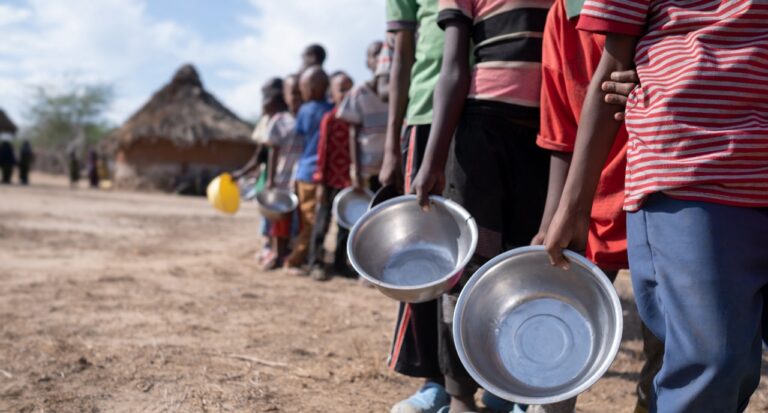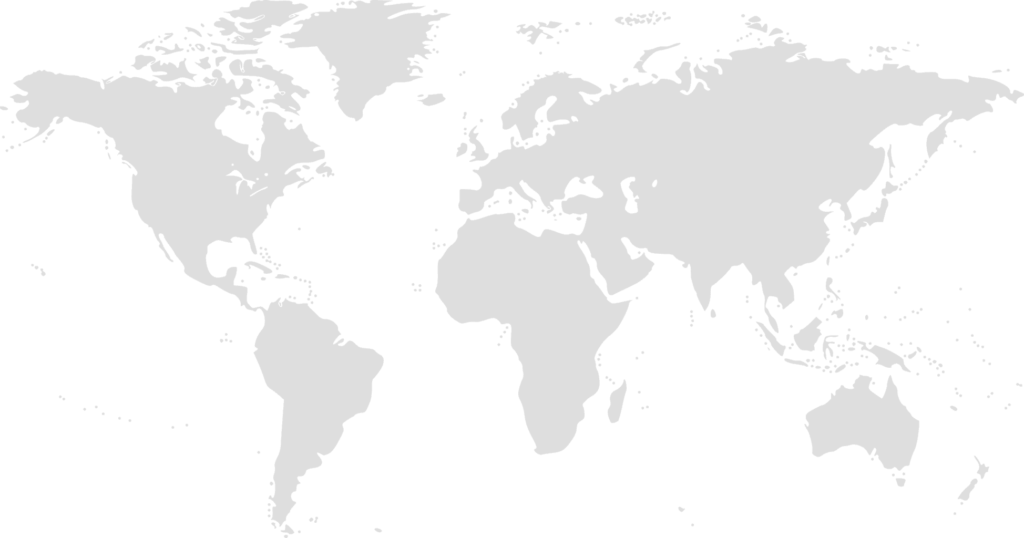Each Student to World online course includes both text-based and video-based curriculum options. Both versions have the same content, so individual students can choose the method that works best for them.
Everyday Breakfast
When you hear the term Global Hunger, what images come to your mind?
- Do you think of people you know or people you have never met?
- Do you think of yourself, your family and your community or do you think of photos or videos you have seen?

Through the next four modules, you’ll explore the theme of Global Hunger as it is experienced around the world. You’ll see how we are all connected through our shared need for food.
We are connected by food, in part, because as humans we all need it to survive. However, we are also connected by food because of how it is produced and consumed.
We Are All Connected By Food
In December of 1967, just a few months before his assassination, United States civil rights leader Dr. Martin Luther King gave a sermon about “global mutuality,” or the ways in which, no matter where we live, we are all connected to one another. During his sermon, he talked about how we are all dependent on one another through food:
Audio: listen to Dr. King’s sermon. Full sermon here (time code for language below: 8:10 – 8:51)
“…you go in the kitchen to drink your coffee for the morning and that’s poured in your cup by a South American, or maybe you want tea and that’s poured in your cup by a Chinese, or maybe you’re desirous of having cocoa for breakfast, and that’s poured in your cup by a West African. And then you reach over for your toast, and that’s given to you at the hands of an English-speaking farmer, not to mention the baker. And before you finish eating breakfast in the morning, you’ve depended on more than half the world.”
Think about the food you eat in the terms used by Dr. King:
- Do you know who contributes to all that is poured in your cup?
- Do you know at whose hands your breakfast is given to you?
- Do you know how your breakfast connects you to people across the globe?
The Story of Our Breakfasts
What was the last breakfast you ate? What were all the ingredients? What countries did they come from? They likely came from all over the world. Our breakfasts show how we are all connected. It’s amazing to think about how far our foods travel to get to us. Where did your breakfast ingredients start? How did they get to you?
For example, let’s say you are living in Amman, Jordan and ate a common Jordanian breakfast of:
- feta cheese
- sliced toast
- fava beans
- thyme
- a banana
- black tea
About This Course
This course was created by our unique, youth-led global internship program. Visit the course page to view learning objectives, standards alignments, content formats, and more.
Watch a Video of Module 1 Part 1
As part of Global Nomads Group’s commitment to accessibility, all Student to World video courses include American Sign Language interpretation and Closed Captioning in English and Arabic.
Key Vocabulary
Consume. v. To use up something.
Factor. n. A fact or situation that influences the result of something.
Mutuality. n. The sharing of a feeling, action, or relationship between two or more parts.
Root. n. The basic cause, source, or origin of something.
Root cause. n. The basic cause of something.
Sermon. n. A long talk in which someone advises other people how they should behave in order to be better people.
Register
Teachers, Educators, & Leaders
Create an account and invite students or youth participants.
Students
If your teacher or group facilitator gave you a code.
Independent Learners
Take a course on your own.
Already have an account?
Zahara, Youth from Morocco
“My name is Zahira B from Bengriir Morocco. Breakfast is the most important meal of the day. Everyday I take my breakfast at 7:30a.m with my family. l the help my mother in preparing coffee, after that I drink a cup of coffee made in Switzerland is great way to start my day. I eat bread from our town,and cheese which came from France EXTAPOR, and I eat a creamy yogurt which is delicious and nourishing. l also love olive oil which is rich in omega-3. l imagine the local farmers spending hours, working under sun taking care of the olive oil tree to give us a high-quality olive oil. Also as a Morocco girl living in a small city I feel connected with other people from different countries thank to the food we eat each day.”
Zahara, Youth from Morocco
“My name is Zahira B from Bengriir Morocco. Breakfast is the most important meal of the day. Everyday I take my breakfast at 7:30a.m with my family. l the help my mother in preparing coffee, after that I drink a cup of coffee made in Switzerland is great way to start my day. I eat bread from our town,and cheese which came from France EXTAPOR, and I eat a creamy yogurt which is delicious and nourishing. l also love olive oil which is rich in omega-3. l imagine the local farmers spending hours, working under sun taking care of the olive oil tree to give us a high-quality olive oil. Also as a Morocco girl living in a small city I feel connected with other people from different countries thank to the food we eat each day.”
Where did these ingredients come from? Click the map to see!

The fava beans (California Garden Co.) are grown
in California, USA (continent: North America).
The bananas (Chiquita brand) could be from
Mexico, Panama, Costa Rica, Guatemala, Nicaragua
(continent: North America), Honduras, Ecuador,
Colombia (continent: South America).
The black tea (Ahmad Tea) is made in
London, United Kingdom (continent: Europe).
The cheese (Panda, Arab Dairy Products Co)
is made in Egypt (continent: Africa).
The thyme is grown in Nablus, Palestine
(continent: Asia).
The Olive Oil (Al-Barakat) is grown and
processed in Jordan (continent: Asia)
The toast (Golden Sliced, Maxims Co.) is made
in Beirut, Lebanon (continent: Asia).
The fava beans (California Garden Co.) are grown in California, USA (continent: North America).
- The bananas (Chiquita brand) could be from Mexico, Panama, Costa Rica, Guatemala, Nicaragua (continent: North America), Honduras, Ecuador, Colombia (continent: South America).
- The black tea (Ahmad Tea) is made in London, United Kingdom (continent: Europe).
- The cheese (Panda, Arab Dairy Products Co) is made in Egypt (continent: Africa).
- The thyme is grown in Nablus, Palestine (continent: Asia).
- The Olive Oil (Al-Barakat) is grown and processed in Jordan (continent: Asia)The toast (Golden Sliced, Maxims Co.) is made in Beirut, Lebanon (continent: Asia).
Your single breakfast meal could have come from as many as five continents and fourteen countries. But what does your breakfast have to do with global hunger?
Our Breakfasts and Global Hunger
If you are going to take action to end global hunger, it is important to understand all of the connections between countries in the production and consumption of food. Later, you will explore the root causes of hunger in your community and around the world.
The term root cause refers to a basic factor that leads to a specific condition or set of conditions.
When you think about the root causes of hunger, what do you think about?
- Do you think about how much food costs relative to how much money people have?
- Do you think about how food is produced, distributed and consumed across the world?
- Do you think about the climate necessary for healthy crops to grow?
- Do you think about access to clean water?
- Do you think about political decisions and policies?
- Do you think about how resources are shared?
You’re Ready to Explore…
Now that you understand the ways that food connects people, you’re ready to explore new perspectives about breakfast from around the world. Imagine you’re traveling to other countries to hear what other young people have to say about breakfasts in their lives. Their stories and more are waiting for you on the next page.
To explore stories and resources, register for this course!
Register
Teachers, Educators, & Leaders
Create an account and invite students or youth participants.
Students
If your teacher or group facilitator gave you a code.
Independent Learners
Take a course on your own.
Already have an account?
About This Course
This course was created by our unique, youth-led global internship program. Visit the course page to view learning objectives, standards alignments, content formats, and more.
Watch a Video of Module 1 Part 1
As part of Global Nomads Group’s commitment to accessibility, all Student to World video courses include American Sign Language interpretation and Closed Captioning in English and Arabic.
Key Vocabulary
Consume. v. To use up something.
Factor. n. A fact or situation that influences the result of something.
Mutuality. n. The sharing of a feeling, action, or relationship between two or more parts.
Root. n. The basic cause, source, or origin of something.
Root cause. n. The basic cause of something.
Sermon. n. A long talk in which someone advises other people how they should behave in order to be better people.
Register
Teachers, Educators, & Leaders
Create an account and invite students or youth participants.
Students
If your teacher or group facilitator gave you a code.
Independent Learners
Take a course on your own.

